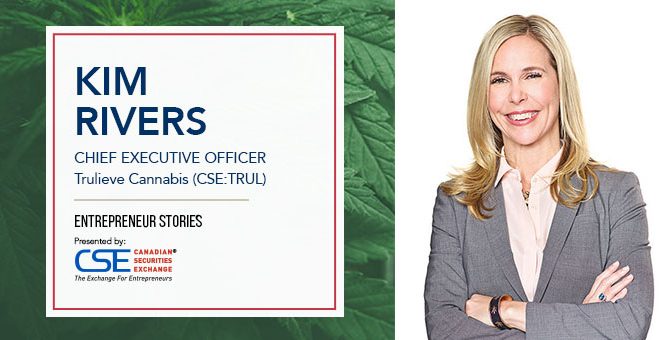According to Trulieve Cannabis (CSE:TRUL) Chief Executive Officer Kim Rivers, cannabis is emotional.
“In many contexts, either you or your loved one has felt relief from a medical condition using cannabis,” Rivers says. “It makes it an interesting business space because folks are predisposed to feel something towards what you’re selling. Understanding and embracing that is part of the brand strategy.”
Trulieve built its brand selling medicinal cannabis to over 158,000 customers in Florida, the fastest-growing cannabis market in the United States. The company is the dominant player in the state, with a network of 28 retail locations and a statewide delivery program. Now, Rivers and her team are turning their attention to the rest of the US, confident that their vertically integrated business model is repeatable in other states.
Founded in 2014, Trulieve was one of the initial applicants and license winners in Florida. According to Rivers, the company’s impetus was to build a “true brand” that could penetrate the Florida market, a 21 million-strong population of socially and economically diverse inhabitants. This diversity makes it an ideal testing ground for franchise-building, which is what Rivers and her team set out to accomplish.
According to Rivers, if you build scale, you build a brand. Trulieve’s team did this by creating a “seed-to-sale” operation that produces nearly 35,000 kilograms of private label medical grade cannabis products, representing over 195 SKUs marketed at Trulieve-branded dispensaries.
The company went public on the Canadian Securities Exchange in 2018 when it felt that it had become the dominant player in Florida. The decision was also driven by management’s sense that the time had come to move into new markets.
“We’re ready to take the show on the road and prove out the next stage of growth by building a true multistate operational footprint,” Rivers says.
Multistate expansion
In the fourth quarter of 2018, Trulieve announced acquisitions in Massachusetts and California, two very different markets.
In Massachusetts, where Trulieve acquired Life Essence Inc., the state’s regulatory system is similar to Florida’s, making it a natural fit. Currently, Trulieve is applying for licenses to build and operate three medical dispensaries, three recreational licenses, and permitting for a 140,000 square foot cultivation facility it would like to begin operating in the fourth quarter of 2019.
In California, the world’s single largest cannabis market, Trulieve is using a somewhat different approach. Here, the company acquired a controlling interest in Leef Industries LLC, a licensed medical and adult-use dispensary in Palm Springs. Rivers is conscious that saturation of the California cannabis market could pose a challenge for new operators to build up in the state, which is why the team is adopting a more patient approach to grow the brand. The retail location in California will serve as a research base for Trulieve to learn about what people are buying.
While having a presence in California will be great for brand recognition, Rivers is particularly excited about the opportunity to grow in the northeast United States.
“Massachusetts is a catalyst win for us because we can build synergies around that hub in the northeast,” explains Rivers.
More recently, Trulieve completed its acquisition of The Healing Corner, a dispensary located in Bristol, Connecticut. The state is an important market for Trulieve, as it is located in the Northeast where the company is focused and is home to more than 34,000 patients and 1,100 consulting physicians.
“The Healing Corner also shares our philosophy of growing a business profitably and has generated consistent profits. The acquisition was based on trailing EBITDA and we anticipate it will be accretive.”
Coast-to-coast brand building
Building a brand on both coasts is not as simple as having a presence, however. Rivers sees what she calls an “east coast, west coast philosophy” in the cannabis market that can make expansion even more challenging.
“How can we create a company and a consumer experience that bridges this cultural gap?” she asks. “We try to be cognizant that we want to create connectivity to local markets. One way we do this is to invite local providers onto shelves.”
According to Rivers, the company could speed up its retail lease in Massachusetts, but the team needs to be confident that they can deliver the Trulieve experience, which hinges on whether they can get the growing facility built in the face of significant supply constraints in the state.
It’s one of the lessons that they learned by watching other companies who stumbled in Florida. “Some of our competitors rushed to open retail with only two or three SKUs, and it does irreparable damage to the brand,” Rivers says.
For Trulieve, the challenge is to be able to replicate its Florida success in new states with different market dynamics.
“When moving into other markets, it’s important to be confident in what differentiates you from your competitors,” Rivers points out. “For us, it’s having pipeline management and the ability to offer superior customer service and competitive pricing.”
Trulieve chose early on to set a national pricing strategy that is competitive in mature medical markets so that every customer can have a similar, state-agnostic retail experience. “If we want to compete nationally then we have to have prices that can translate,” says Rivers.
Strategy pays off
If early revenues are any indication, the brand strategy is paying off. In May, Trulieve reported revenue of US $44.5 million for the first quarter of 2019, up from $15.2 million during the year-ago quarter. 2018 full year revenues were around $103 million, up almost 420%.
Income was also up exponentially from the same period a year earlier, at $43 million compared to $3.8 million.
Of course, these reported numbers don’t include any ramp-up in Massachusetts or the recent acquisition in Connecticut, and only a low single-digit percentage from California. In the current business year, Rivers and her team anticipate revenue topping $220 million.
There are a few external factors that could influence that revenue figure. Two bills in the US House of Representatives are expected to be tabled this year that could open new financing streams and fast-track the cannabis company’s ability to move operations forward.
The STATES Act would allow states to craft their own policies on cannabis. While it wouldn’t legalize the drug nationally, it would largely resolve conflicts between state and federal law.
Meanwhile, the Secure and Fair Enforcement banking act, or SAFE Act, would allow banks to service cannabis companies that comply with state laws, enabling them to access new streams of capital south of the border.
Both bills have a significant amount of bipartisan support, but Rivers and Trulieve are not relying on legislation to take the business to the next level.
“With respect to stability from a banking standpoint, the SAFE Act is not necessary, but is needed,” Rivers explains. “Larger institutions are charging absurd fees, especially for a business like ours that is driven by fundamentals. Typical debt structures are not available in the cannabis industry. If I want to raise debt, I have to talk to a fund that is cannabis-specific.”
Unlike other merchandisers, a retail license for a cannabis company is tied to the location specified on the license application. If a landlord raises the rent for that building, for example, the company has very few options to consider if it wants to keep the business open.
Emotional journey
What both bills signify is that the cannabis mindset in the US is changing from stigmatization to acceptance. A large part of that shift is thanks to the industry itself, and players like Trulieve.
In Florida, the company supports the advocate community through sponsorships and outreach efforts. It recently sponsored the “silver tour” in Florida led by cannabis pioneer Robert Platshorn, AKA Bobby Tuna, who spent some 30 years in federal prison on marijuana charges and now travels to senior citizen facilities to educate residents on the benefits of medical cannabis.
It all circles back to Rivers’ observation that led to the company’s founding and informs its strategy – that marijuana is emotional, and consumers form an almost personal attachment to brands. For Trulieve, that attachment is the driving force behind its growth and profitability.
“We’ve built Trulieve into a customer-first company with a focus on profitable growth,” Rivers concludes. “I believe strongly that you can be successful in this industry and build long-term value for shareholders by being a true operator.”
This story was originally published at www.proactiveinvestors.com on June 21, 2019 and featured in the Public Entrepreneur magazine.
Learn more about Trulieve Cannabis at https://www.trulieve.com/.






